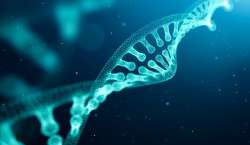Mysterious circular DNA may cause cancer in kids: Study
Mysterious rings of DNA, known as extrachromosomal circular DNA, could lead to cancer in children, researchers have revealed.

Mysterious rings of DNA, known as extrachromosomal circular DNA, could lead to cancer in children, researchers have revealed. Producing the first detailed map of circular DNA, the scientists from the Charite - Universitatsmedizin Berlin (University in Berlin) have allowed unanticipated insights into the long-standing questions in the field of cancer genetics.
According to the study, published in the journal Nature Genetics, the researchers showed that rings of DNA (deoxyribonucleic acid) could cause disruption of cells' genetic information, leading to growth of cancer.
Every year, nearly half a million people in Germany develop cancer. Approximately 2,100 cancer patients are under the age of 18.
Working with colleagues from the Barcelona Supercomputing Center, the researchers analysed neuroblastoma tissue samples from 93 children. It revealed that the prevalence and diversity of circular DNA was far greater than anticipated.
According to the findings, each tissue sample contained around 5,000 circular DNA copies.
DNA sequencing also revealed the process by which specific DNA sections separated from a chromosome to form circular DNA before reintegrating into the chromosome at a different location.
"This can potentially cause cancer if it results in the original sequence of genetic information being disrupted," said study researcher Anton Henssen.
"The detailed processes involved had not previously been elucidated in this manner and provide insight into how even young cells, like those found in children, can transform into cancer cells," Hensse said.
The researchers could also show that certain types of circular DNA might accelerate neuroblastoma growth. "Testing for their presence may make it easier to predict the course of disease. Additionally, studying this process in the relatively quiet genomes of these pediatric tumours may help illuminate similar mechanisms that were missed in more complex adult cancers," said study researcher Richard Koche.
"Given the recent interest in circular DNA in a variety of normal and disease contexts, the current study may have implications for a broad range of tumor types and associated clinical outcomes," Koche said.
Inputs from IANS.